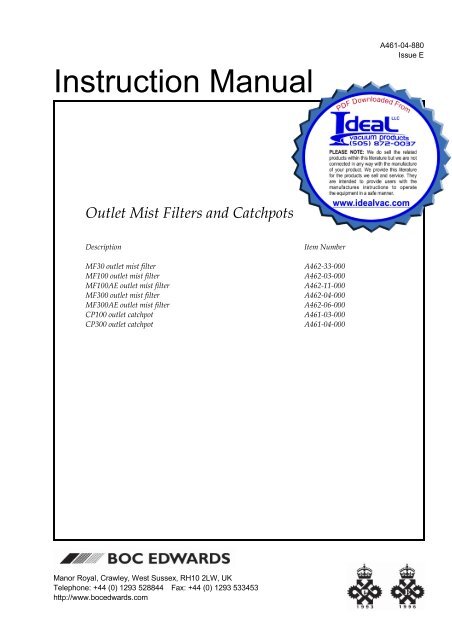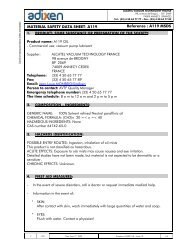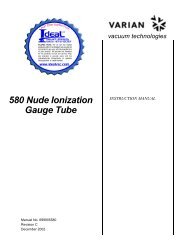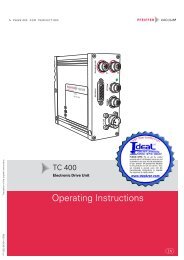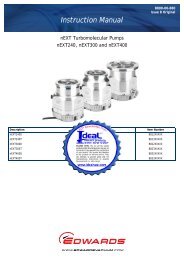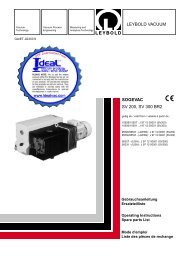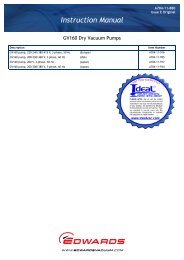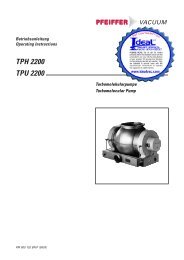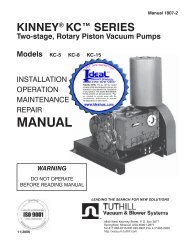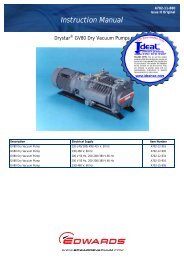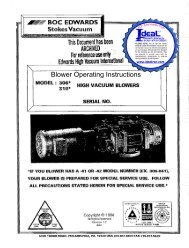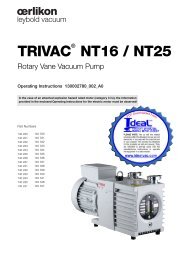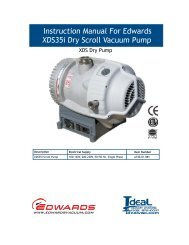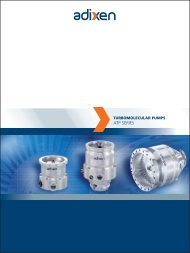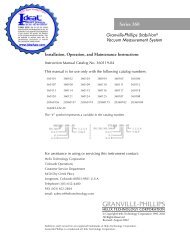Edwards, Outlet Mist Filters, Catchpots, MF30, MF100, MF100AE ...
Edwards, Outlet Mist Filters, Catchpots, MF30, MF100, MF100AE ...
Edwards, Outlet Mist Filters, Catchpots, MF30, MF100, MF100AE ...
You also want an ePaper? Increase the reach of your titles
YUMPU automatically turns print PDFs into web optimized ePapers that Google loves.
Instruction Manual<br />
A461-04-880<br />
Issue E<br />
<strong>Outlet</strong> <strong>Mist</strong> <strong>Filters</strong> and <strong>Catchpots</strong><br />
Description<br />
<strong>MF30</strong> outlet mist filter<br />
<strong>MF100</strong> outlet mist filter<br />
<strong>MF100</strong>AE outlet mist filter<br />
<strong>MF30</strong>0 outlet mist filter<br />
<strong>MF30</strong>0AE outlet mist filter<br />
CP100 outlet catchpot<br />
CP300 outlet catchpot<br />
Item Number<br />
A462-33-000<br />
A462-03-000<br />
A462-11-000<br />
A462-04-000<br />
A462-06-000<br />
A461-03-000<br />
A461-04-000<br />
Manor Royal, Crawley, West Sussex, RH10 2LW, UK<br />
Telephone: +44 (0) 1293 528844 Fax: +44 (0) 1293 533453<br />
http://www.bocedwards.com
CONTENTS<br />
Section Title Page<br />
1 INTRODUCTION 1<br />
1.1 Scope and definitions 1<br />
1.2 Description 2<br />
1.2.1 <strong>MF30</strong> mist filter 2<br />
1.2.2 <strong>MF100</strong>, <strong>MF100</strong>AE, <strong>MF30</strong>0 and <strong>MF30</strong>0AE<br />
mist filters 4<br />
1.2.3 CP100 and CP300 catchpots 6<br />
2 TECHNICAL DATA 6<br />
2.1 <strong>Mist</strong> filters 6<br />
2.2 <strong>Catchpots</strong> 7<br />
3 INSTALLATION 11<br />
3.1 Unpack and inspect 11<br />
3.2 Install the <strong>MF30</strong> mist filter 12<br />
3.3 Install the <strong>MF100</strong> or <strong>MF100</strong>AE mist filter 14<br />
3.4 Install the <strong>MF30</strong>0 or <strong>MF30</strong>0AE mist filter 16<br />
3.5 Install the CP100 or CP300 catchpot 16<br />
4 OPERATION 18<br />
5 MAINTENANCE 18<br />
5.1 Change the <strong>MF30</strong> filter element 19<br />
5.2 Change the <strong>MF100</strong>, <strong>MF100</strong>AE, <strong>MF30</strong>0 or <strong>MF30</strong>0AE<br />
filter element 19<br />
5.3 Clean the CP100 or CP300 catchpot 20<br />
5.4 Replace the <strong>MF100</strong>AE or <strong>MF30</strong>0AE sight-glass 20<br />
DBW 5808-97<br />
6 STORAGE AND DISPOSAL 21<br />
6.1 Storage 21<br />
6.2 Disposal 21<br />
<strong>Outlet</strong> <strong>Mist</strong> <strong>Filters</strong> and <strong>Catchpots</strong><br />
i
Section Title Page<br />
7 SERVICE, SPARES AND ACCESSORIES 21<br />
7.1 Introduction 21<br />
7.2 Service 22<br />
7.3 Spares 22<br />
7.4 Accessories 22<br />
Illustrations<br />
RETURN OF EDWARDS EQUIPMENT<br />
Figure Title Page<br />
1 <strong>MF30</strong> oil mist filter 3<br />
2 <strong>MF100</strong> and <strong>MF100</strong>AE oil mist filters and CP100 catchpot 5<br />
3 Dimensions (mm) : <strong>MF30</strong> oil mist filter 8<br />
4 Dimensions (mm) : <strong>MF100</strong> and <strong>MF100</strong>AE oil mist filters<br />
and CP100 catchpot 9<br />
5 Dimensions (mm) : <strong>MF30</strong>0 and <strong>MF30</strong>0AE oil mist filter<br />
and CP300 catchpot 10<br />
6 Installation of an <strong>MF30</strong> oil mist filter onto an E2M28 pump 13<br />
7 Installation of an <strong>MF100</strong> oil mist filter or a CP100 catchpot<br />
onto an EM40 or an EM80 pump 15<br />
8 Installation of an <strong>MF30</strong>0 oil mist filter or a CP300 catchpot<br />
onto an EM175 or an EM275 pump 17<br />
Tables<br />
Table Title Page<br />
1 Checklist of items 11<br />
ii<br />
<strong>Outlet</strong> <strong>Mist</strong> <strong>Filters</strong> and <strong>Catchpots</strong>
1 INTRODUCTION<br />
1.1 Scope and definitions<br />
This manual provides installation, operation and maintenance instructions for<br />
the following <strong>Edwards</strong> accessories :<br />
• <strong>MF30</strong>, <strong>MF100</strong>, <strong>MF100</strong>AE, <strong>MF30</strong>0 and <strong>MF30</strong>0AE outlet mist filters<br />
• CP100 and CP300 outlet catchpots<br />
You must use these accessories as specified in this manual.<br />
Read this manual before you install and operate the accessory. Important safety<br />
information is highlighted as WARNING and CAUTION instructions; you must<br />
obey these instructions. The use of WARNINGS and CAUTIONS is defined<br />
below.<br />
WARNING<br />
Warnings are given where failure to observe the instruction could result in<br />
injury or death to people.<br />
CAUTION<br />
Cautions are given where failure to observe the instruction could result in<br />
damage to the equipment, associated equipment and process.<br />
The units used throughout this manual conform to the SI international system<br />
of units of measurement.<br />
<strong>Outlet</strong> <strong>Mist</strong> <strong>Filters</strong> and <strong>Catchpots</strong> 1
1.2 Description<br />
<strong>Outlet</strong> mist filters separate and trap the oil mist which is discharged with the<br />
exhaust gases from oil-sealed rotary vacuum pumps when gas-ballast is used<br />
or when very high gas throughputs are pumped. The mist filter traps oil mist<br />
with an efficiency of better than 99.9%. The <strong>MF100</strong>AE mist filter is designed<br />
specifically for use with aggressive processes, for example with corrosive and<br />
toxic gases and vapours.<br />
An oil return accessory kit is available for <strong>MF100</strong> and <strong>MF30</strong>0 mist filters to<br />
continuously return the trapped oil to the pump reservoir. You may use this<br />
accessory kit when the exhaust gases will not contaminate the pump oil. Refer<br />
to Section 7.<br />
<strong>Outlet</strong> catchpots fit into the pipeline between the pump-outlet and an external<br />
exhaust-extraction system. The catchpot traps any condensed liquids in the<br />
exhaust-extraction pipeline that could otherwise drain into the pump and<br />
contaminate it.<br />
1.2.1 <strong>MF30</strong> mist filter<br />
Refer to Figure 1 which shows the <strong>MF30</strong> mist filter. Numbers in brackets in the<br />
following description refer to items shown on this figure.<br />
The <strong>MF30</strong> mist filter has a cast aluminium body (5). The filter element (12) is<br />
made from epoxy impregnated glass-fibre, stainless steel and nickel-plated mild<br />
steel.<br />
The exhaust gases from the pump enter the inlet (13) of the filter and then pass<br />
down through the centre of the filter element. (The path of the exhaust gases<br />
through the filter is shown by the arrows in Figure 1).<br />
The filter element separates and traps the oil mist and the trapped oil drains into<br />
the base of the mist filter. The oil-free exhaust gases are then discharged through<br />
the mist filter outlet (4).<br />
The body of the mist filter has a sight-glass (8) so that you can see the level of<br />
oil trapped in the mist filter. The body also has a drain-plug (9) so that you can<br />
drain the trapped oil from the filter.<br />
2 <strong>Outlet</strong> <strong>Mist</strong> <strong>Filters</strong> and <strong>Catchpots</strong>
1. Top-cover 9. Drain-plug and ’O’ ring<br />
2. ’O’ ring 10. Support bolt hole<br />
3. Gasket 11. Spring<br />
4. <strong>Outlet</strong> fitted with 12. Filter element<br />
NW25 x 1 inch BSP adaptor<br />
13. Inlet fitted with ’C’ clamp,<br />
5. Body blank flange, screws and washers<br />
6. Sight-glass bezel 14. Fitting-kit components<br />
7. M3 x 8 screw and washer 15. M5 screw and washer<br />
8. Sight-glass 16. M5 ’break’ screw positions<br />
Figure 1 - <strong>MF30</strong> oil mist filter<br />
<strong>Outlet</strong> <strong>Mist</strong> <strong>Filters</strong> and <strong>Catchpots</strong> 3
1.2.2 <strong>MF100</strong>, <strong>MF100</strong>AE, <strong>MF30</strong>0 and <strong>MF30</strong>0AE mist filters<br />
Refer to Figure 2 which shows the <strong>MF100</strong> and <strong>MF100</strong>AE mist filters. Numbers<br />
in brackets in the following description refer to items shown on this figure. The<br />
<strong>MF30</strong>0 and <strong>MF30</strong>0AE are larger but have a similar construction.<br />
The filters have fine-pore filter elements (11) and a stainless steel wire-mesh filter<br />
element (3) inside the steel body (5). The <strong>MF100</strong> and <strong>MF100</strong>AE have two<br />
fine-pore filter elements and the <strong>MF30</strong>0 has four fine-pore filter elements.<br />
The <strong>MF100</strong>AE is designed for use with corrosive and toxic gases and vapours.<br />
It is leak tested to 1 x 10 -4 mbar.ls -1 (1 x 10 -2 Pa.ls -1 ) and the filter elements, sightglasses<br />
and seals are resistant to chemical attack.<br />
The exhaust gases from the pump enter the inlet (17) of the filter and pass down<br />
through the filter elements (11) which separate and trap the oil mist. (The path<br />
of the exhaust gases through the filter is shown by the arrows in Figure 2).<br />
The exhaust gases then pass through the stainless steel wire mesh element (3)<br />
which traps any large droplets of oil carried by the filtered gas. The oil-free<br />
exhaust gases are then discharged through the outlet (1). The trapped oil drains<br />
into the base of the body of the mist filter.<br />
The mist filter has a sight-glass (10) so that you can see the level of oil trapped<br />
in the mist filter. The sight-glass indicates the maximum level at which the filter<br />
operates efficiently.<br />
The sight-glass in the <strong>MF100</strong> and <strong>MF30</strong>0 mist filters is glued in position inside<br />
the body of the mist filter. The sight-glass in the <strong>MF100</strong>AE and <strong>MF30</strong>0AE mist<br />
filters is secured in position by a bezel and ’O’ rings. If necessary, you can<br />
replace the sight-glass in the <strong>MF100</strong>AE and <strong>MF30</strong>0AE mist filters.<br />
The body has a drain-valve (9) so that you can drain the trapped oil from the<br />
filter.<br />
The spring-loaded pressure-relief valve (2) prevents a dangerous pressure<br />
build-up inside the pump and the body if the filter becomes blocked.<br />
4 <strong>Outlet</strong> <strong>Mist</strong> <strong>Filters</strong> and <strong>Catchpots</strong>
1. <strong>Outlet</strong><br />
2. Relief valve<br />
3. Wire mesh element<br />
4. Screw<br />
5. Body<br />
6. Retaining plate<br />
7. Mounting-stud holes<br />
8. Nut<br />
9. Drain-valve<br />
10. Sight-glass (mist filters only)<br />
11. Element (mist filters only)<br />
12. Sight-glass (catchpots only)<br />
13. Gasket<br />
14. Top cover gasket<br />
15. 1 inch BSP plug<br />
16. Top-cover<br />
17. Inlet<br />
18. Pan-head screw (4 off, <strong>MF100</strong>AE only)<br />
19. Bezel (<strong>MF100</strong>AE only)<br />
20. Sight-glass (<strong>MF100</strong>AE only)<br />
21. ’O’ rings (<strong>MF100</strong>AE only)<br />
22. Compression ring (<strong>MF100</strong>AE only)<br />
Figure 2 - <strong>MF100</strong> and <strong>MF100</strong>AE oil mist filters and CP100 catchpot<br />
(<strong>MF100</strong> and <strong>MF100</strong>AE shown)<br />
<strong>Outlet</strong> <strong>Mist</strong> <strong>Filters</strong> and <strong>Catchpots</strong> 5
1.2.3 CP100 and CP300 catchpots<br />
The body of the catchpot is identical to the body of the corresponding size mist<br />
filter (refer to Figure 2), but the catchpot does not have internal filter elements.<br />
The catchpot has a sight-glass (12) which is glued in position inside the body of<br />
the catchpot. The sight-glass allows you to see the level of condensed liquid<br />
trapped in the catchpot. When the fluid level reaches the sight-glass (12), you<br />
must drain the oil from the catchpot through the drain valve (9).<br />
2 TECHNICAL DATA<br />
2.1 <strong>Mist</strong> filters<br />
Dimensions<br />
<strong>MF30</strong> see Figure 3<br />
<strong>MF100</strong>/<strong>MF100</strong>AE see Figure 4<br />
<strong>MF30</strong>0/<strong>MF30</strong>0AE see Figure 5<br />
Mass<br />
<strong>MF30</strong><br />
1.3 kg<br />
<strong>MF100</strong>/<strong>MF100</strong>AE<br />
12 kg<br />
<strong>MF30</strong>0/<strong>MF30</strong>0AE<br />
28 kg<br />
Filter material<br />
<strong>MF30</strong>/<strong>MF100</strong>/<strong>MF30</strong>0<br />
Epoxy impregnated glass-fibre<br />
<strong>MF100</strong>AE/<strong>MF30</strong>0AE<br />
Stainless steel mesh<br />
Number of filter elements<br />
<strong>MF30</strong> 1<br />
<strong>MF100</strong>/<strong>MF100</strong>AE 2<br />
<strong>MF30</strong>0/<strong>MF30</strong>0AE 4<br />
Inlet and outlet ports Inlet <strong>Outlet</strong><br />
<strong>MF30</strong> NW25 NW25<br />
<strong>MF100</strong>/<strong>MF100</strong>AE NW25 1 inch BSP<br />
<strong>MF30</strong>0/<strong>MF30</strong>0AE ISO40 ISO40<br />
Ambient temperature range (operation) 0 to 40 o C<br />
Ambient temperature range (storage)<br />
0 to 40 o C<br />
6 <strong>Outlet</strong> <strong>Mist</strong> <strong>Filters</strong> and <strong>Catchpots</strong>
Rated flow<br />
<strong>MF30</strong> 30 m 3 h -1<br />
MF80 80 m 3 h -1<br />
<strong>MF30</strong>0 275 m 3 h -1<br />
Relief pressure<br />
0.35 bar, 3.5 x 10 4 Pa<br />
For use with <strong>Edwards</strong> rotary pumps<br />
<strong>MF30</strong><br />
E2M28<br />
<strong>MF100</strong>/<strong>MF100</strong>AE<br />
E1M40, E1M80, E2M40,<br />
E2M80 and Superpumps<br />
<strong>MF30</strong>0/<strong>MF30</strong>0AE<br />
E1M175, E1M275, E2M175,<br />
E2M275<br />
Leak-tightness (<strong>MF100</strong>AE/<strong>MF30</strong>0AE) 1 x 10 -4 mbar.ls -1 ,<br />
1 x 10 -2 Pa.ls -1<br />
2.2 <strong>Catchpots</strong><br />
Dimensions<br />
CP100 See Figure 4<br />
CP300 See Figure 5<br />
Mass<br />
CP100<br />
12.0 kg<br />
CP300<br />
28.0 kg<br />
Capacity<br />
CP100<br />
6.5 l<br />
CP300<br />
23.0 l<br />
Inlet and outlet port size Inlet <strong>Outlet</strong><br />
CP100 NW25 1 inch BSP<br />
CP300 NW40 NW40<br />
For use with <strong>Edwards</strong> rotary pumps<br />
CP100<br />
E1M40, E1M80, E2M40,<br />
E2M80 and Superpumps<br />
CP300<br />
E1M175, E1M275, E2M175,<br />
E2M275<br />
<strong>Outlet</strong> <strong>Mist</strong> <strong>Filters</strong> and <strong>Catchpots</strong> 7
Figure 3 - Dimensions (mm) : <strong>MF30</strong> oil mist filter<br />
8 <strong>Outlet</strong> <strong>Mist</strong> <strong>Filters</strong> and <strong>Catchpots</strong>
1. Fixing hole: 2 x M10<br />
Figure 4 - Dimensions (mm): <strong>MF100</strong> and <strong>MF100</strong>AE oil mist filters and<br />
CP100 catchpot (<strong>MF100</strong> shown)<br />
<strong>Outlet</strong> <strong>Mist</strong> <strong>Filters</strong> and <strong>Catchpots</strong> 9
Figure 5 - Dimensions (mm) : <strong>MF30</strong>0 and <strong>MF30</strong>0AE oil mist filter and<br />
CP300 catchpot (<strong>MF30</strong>0 shown)<br />
10 <strong>Outlet</strong> <strong>Mist</strong> <strong>Filters</strong> and <strong>Catchpots</strong>
3 INSTALLATION<br />
WARNING<br />
You must remove the protective cover from the outlet of the filter or<br />
catchpot. A dangerous build-up of pressure can occur if the outlet is<br />
blocked.<br />
3.1 Unpack and inspect<br />
Remove all packing materials and inspect your accessory<br />
If your accessory is damaged, notify your supplier and the carrier in writing<br />
within three days; state the Item Number of the accessory together with your<br />
order number and your supplier’s invoice number. Do not use the accessory if<br />
it is damaged.<br />
Check that your package contains the items shown in Table 1. If any of the items<br />
is missing, notify your supplier in writing within three days.<br />
Qty Description Check (✓)<br />
1 Oil <strong>Mist</strong> Filter or Catchpot ❏<br />
1 Fitting pack ❏<br />
1 ’O’ ring ❏<br />
Table 1 - Checklist of items<br />
If the accessory is not to be used immediately, return it to its protective<br />
packaging. Store the accessory in clean dry conditions, away from direct sources<br />
of heat and sunlight.<br />
<strong>Outlet</strong> <strong>Mist</strong> <strong>Filters</strong> and <strong>Catchpots</strong> 11
3.2 Install the <strong>MF30</strong> mist filter<br />
Refer to Figure 6 for items in brackets. You must install the <strong>MF30</strong> filter vertically<br />
with the exhaust flow in the direction of the arrows on the top-cover (1).<br />
1. Clean the area around the pump-outlet.<br />
2. Unscrew and remove the outlet connector from the pump.<br />
3. Fit the NW25 x 3 /4 inch BSP adaptor (4) supplied in the fitting kit in place<br />
of the outlet connector. Reuse the original ’O’ ring from the outlet connector<br />
if it is in good condition. If necessary, fit a new ’O’ ring.<br />
4. Undo the ’C’ clamp (2) on the mist filter and remove the blanking plate and<br />
Co-Seal.<br />
5. Use the ’C’ clamp and Co-Seal (2) to connect the elbow (3) to the <strong>MF30</strong> filter.<br />
6. Use the clamping ring and centring-ring (4) to fit the elbow (3) to the<br />
pump-outlet adaptor (5).<br />
7. To support the filter, fit the M8 bolt and locknut (7) from the fitting kit into<br />
the threaded hole near the base of the MF 30 filter (8). Adjust the bolt until<br />
it touches the side of the pump and then tighten the locknut.<br />
8. If necessary, fit an exhaust pipeline to the outlet of the filter (9).<br />
12 <strong>Outlet</strong> <strong>Mist</strong> <strong>Filters</strong> and <strong>Catchpots</strong>
1. Top cover and gasket<br />
2. NW25 ’C’ clamp and Co-Seal<br />
3. NW25 elbow<br />
4. Clamping ring and centring-ring<br />
5. Pump-outlet adaptor<br />
6. E2M28 pump (shown dotted)<br />
7. M8 bolt and locknut<br />
8. <strong>MF30</strong> filter<br />
9. Filter outlet<br />
Figure 6 - Installation of an <strong>MF30</strong> oil mist filter onto an E2M28 pump<br />
<strong>Outlet</strong> <strong>Mist</strong> <strong>Filters</strong> and <strong>Catchpots</strong> 13
3.3 Install the <strong>MF100</strong> or <strong>MF100</strong>AE mist filter<br />
Refer to Figure 7 and use the following procedure to install the filter:<br />
1. Clean the area around the pump-outlet.<br />
2. Fit the support bracket (1) to the pump runner with the spacers (2) and the<br />
screws and washers (9, 11) supplied.<br />
3. Screw the two studs (14 or 15) into the threaded holes in the filter base. Use<br />
the shorter pair of studs (14) for an EM40 pump; use the longer pair of studs<br />
(15) for an EM80 pump. Fit one nut on each stud, about 30 mm from the free<br />
end of the stud.<br />
4. Fit the NW25 elbow (4) to the pump-outlet with the two screws, centring-ring<br />
and ’O’ ring supplied with the pump.<br />
5. Place a washer (12) at the end of each stud (14, 15) and lower the filter so that<br />
the studs pass through the holes in the support bracket (1). Adjust the nuts<br />
so that the filter is level and the filter flange is aligned with the elbow (4).<br />
6. Secure the studs to the support bracket with two washers and nuts and<br />
connect the filter-inlet to the elbow with the centring-ring (5), the ’O’ ring (6)<br />
and the clamp (3) supplied in the fitting kit.<br />
7. Tighten all the screws and nuts securely. Check that the drain-valve<br />
(Figure 2, item 9) is fitted and closed.<br />
8. If necessary, fit an exhaust pipeline to the outlet of the filter.<br />
14 <strong>Outlet</strong> <strong>Mist</strong> <strong>Filters</strong> and <strong>Catchpots</strong>
1. Support bracket 9. M8 x 35 screw<br />
2. Spacer 10. M10 nut<br />
3. NW25 clamp 11. M8 washer<br />
4. NW25 elbow 12. M10 washer<br />
5. NW25 centring-ring 13. Not used<br />
6. ’O’ ring 14. M10 x 110 stud<br />
7. Not used 15. M10 x 140 stud<br />
8. Not used 16. <strong>MF100</strong> filter or CP100 catchpot<br />
Figure 7 - Installation of an <strong>MF100</strong> oil mist filter or a CP100 catchpot onto<br />
an EM40 or an EM80 pump<br />
<strong>Outlet</strong> <strong>Mist</strong> <strong>Filters</strong> and <strong>Catchpots</strong> 15
3.4 Install the <strong>MF30</strong>0 or <strong>MF30</strong>0AE mist filter<br />
Refer to Figure 8 for items in brackets. All of the items you require to install the<br />
filter are included in the fitting pack.<br />
1. Clean the area around the pump-outlet.<br />
2. Fit the lower support bracket (2) to the pump runner with the two screws<br />
and washers (8, 10) supplied.<br />
3. Screw the two studs (9) into the threaded holes in the filter base. Fit one nut<br />
on each stud, about 30 mm from the free end of the stud.<br />
4. Fit the NW40 elbow (3) to the pump-outlet with the flange seal pack (6), ’C’<br />
clamp (4), screws (7) and washers (13) supplied in the fitting pack.<br />
5. Place a washer (10) at the end of each stud (9) and lower the filter so that the<br />
studs pass through the holes in the lower support bracket (2). Adjust the nuts<br />
so that the filter is level and the filter flange is aligned with the elbow (3).<br />
6. Secure the studs to the support bracket with two washers and nuts and fit<br />
the upper support bracket (1) to the pump and the filter.<br />
7. Connect the filter-inlet to the elbow with the flange seal pack (6), ’C’ clamp<br />
(4), screws (15), washers (13) and nuts (14) supplied in the fitting kit.<br />
8. Tighten all the screws and nuts securely. Check that the drain-valve<br />
(Figure 2, item 9) is fitted and closed.<br />
9. If necessary, fit an exhaust pipeline to the outlet of the filter.<br />
3.5 Install the CP100 or CP300 catchpot<br />
The procedure is identical to that for the <strong>MF100</strong> or <strong>MF30</strong>0 filter, as described in<br />
Sections 3.3 and 3.4.<br />
16 <strong>Outlet</strong> <strong>Mist</strong> <strong>Filters</strong> and <strong>Catchpots</strong>
1. Upper support bracket 9. M10 x 90 stud<br />
2. Lower support bracket 10. M10 washer<br />
3. NW40 elbow 11. M10 nut<br />
4. NW40 ’C’ clamp 12. M10 x 30 screw<br />
5. Not used 13. M8 washer<br />
6. Size 40 flange seal pack 14. M8 nut<br />
7. M8 x 35 screw 15. M8 x 40 screw<br />
8. M10 x 40 screw 16. <strong>MF30</strong>0 filter or CP300 catchpot<br />
Figure 8 - Installation of an <strong>MF30</strong>0 oil mist filter or a CP300 catchpot onto<br />
an EM175 or an EM275 pump<br />
<strong>Outlet</strong> <strong>Mist</strong> <strong>Filters</strong> and <strong>Catchpots</strong> 17
4 OPERATION<br />
WARNING<br />
If the oil is contaminated, the filter may become clogged. If the filter is<br />
clogged, the relief valve will open and oil mist will be discharged directly<br />
to the exhaust of the mist filter. You must replace the filter element if it<br />
becomes clogged.<br />
• Check the oil-level in the filter or catchpot regularly.<br />
• The sight-glass may become opaque if it is contaminated by certain process<br />
chemicals in the pump oil; we recommend that you drain the oil regularly<br />
to prevent this. You must drain the oil before the level reaches the maximum<br />
mark on the sight-glass. The rate of oil collection will depend on your<br />
process application.<br />
• Check the oil-level in the pump when you check the filter or catchpot. Oil<br />
trapped in the filter or catchpot has been lost by the pump.<br />
• If you need to drain the filter very frequently, a continuous oil return kit is<br />
available for the <strong>MF100</strong> and <strong>MF30</strong>0 mist filters; see Section 7.<br />
5 MAINTENANCE<br />
WARNING<br />
Avoid contact with components contaminated with dangerous substances<br />
which have been pumped through your vacuum system. Wear protective<br />
clothing when you come into contact with contaminated filters and filter<br />
elements.<br />
WARNING<br />
Isolate the pump from the electrical supply before you start maintenance.<br />
18 <strong>Outlet</strong> <strong>Mist</strong> <strong>Filters</strong> and <strong>Catchpots</strong>
5.1 Change the <strong>MF30</strong> filter element<br />
Refer to Figure 1 for items in brackets.<br />
1. Place a suitable container under the filter drain-plug (9). Remove the<br />
drain-plug and drain any trapped oil, then refit the drain-plug.<br />
2. Use a 4mm hexagon key to remove the 4 retaining screws (15) from the<br />
top-cover (1).<br />
3. Fit two of the screws into the ’break’ screw positions (16) in the top-cover.<br />
Hold the top-cover down (it is under internal spring pressure) and gently<br />
turn the screws clockwise to prise the top-cover (1) away from the<br />
filter-body (5).<br />
4. Remove the top-cover and inspect the ’O’ rings (2). If necessary, replace the<br />
’O’ rings.<br />
5. Lift out the element (12) and the top-gasket (3) and dispose of them safely.<br />
A new top-gasket is supplied with the new element.<br />
6. Wash the interior with a suitable cleaning solution. Replace any ’O’ rings,<br />
seals or gaskets which are damaged.<br />
7. Insert the new element and gasket and centralise the element on the<br />
spring (11).<br />
8. Reposition the top-cover so that the element top-collar locates into the recess<br />
in the cover and the baffle plate is next to the outlet-port (4).<br />
9. Press the assembly down and secure it with the four screws and washers.<br />
Tighten the screws evenly to ensure a leak-tight joint.<br />
5.2 Change the <strong>MF100</strong>, <strong>MF100</strong>AE, <strong>MF30</strong>0 or <strong>MF30</strong>0AE filter element<br />
Refer to Figure 2 for items in brackets.<br />
1. Place a suitable container under the filter drain-valve (9). Open the<br />
drain-valve and drain any trapped oil, then close the drain-valve.<br />
2. Disconnect the filter-inlet and outlet connections.<br />
3. Remove the screws from the top-cover (16) and remove the top-cover and<br />
the filter element(s) (11) from the filter-body (5).<br />
<strong>Outlet</strong> <strong>Mist</strong> <strong>Filters</strong> and <strong>Catchpots</strong> 19
4. Remove the nuts (8) and the retaining plate (6) from the studs which hold<br />
the filter element(s) to the top-cover. Remove the filter element(s) and<br />
dispose of them safely.<br />
5. Wash the interior and the stainless steel mesh filter element (3) with a suitable<br />
cleaning solution. Replace any ’O’ rings, seals or gaskets which are damaged.<br />
6. Fit the replacement filter element(s) onto the studs and refit the retaining<br />
plate and nuts. Tighten the nuts sufficiently to provide an effective seal. Do<br />
not overtighten the nuts.<br />
7. Refit the top-cover and filter(s) onto the filter-body and secure the assembly<br />
with the screws. Reconnect the filter-inlet and outlet connections.<br />
5.3 Clean the CP100 or CP300 catchpot<br />
Refer to Figure 2 for items in brackets.<br />
1. Place a suitable container under the catchpot drain-valve (9). Open the<br />
drain-valve and drain any trapped oil, then close the drain-valve.<br />
2. Disconnect the catchpot-inlet and outlet connections.<br />
3. Undo the retaining screws, remove the top-cover (16) from the catchpot and<br />
examine the interior of the catchpot.<br />
4. If necessary, wash the interior with a suitable cleaning solution. Replace any<br />
’O’ rings, seals or gaskets which are damaged.<br />
5. Refit the top-cover onto the catchpot and secure it with the screws. Reconnect<br />
the inlet and outlet connections to the catchpot.<br />
5.4 Replace the <strong>MF100</strong>AE or <strong>MF30</strong>0AE sight-glass<br />
If necessary, you can replace the sight-glass in the <strong>MF100</strong>AE and <strong>MF30</strong>0AE oil<br />
mist filters; refer to Figure 2 and use the following procedure:<br />
1. Drain the oil from the filter: refer to Step 1 of Section 5.2.<br />
2. Undo and remove the four pan-head screws (18) which secure the sight-glass<br />
bezel (19) to the mist filter.<br />
3. Remove the bezel, the outer ’O’ ring (21) and the sight-glass (20).<br />
4. Locate the new sight-glass in place.<br />
20 <strong>Outlet</strong> <strong>Mist</strong> <strong>Filters</strong> and <strong>Catchpots</strong>
5. Refit the outer ’O’ ring (21, removed in Step 2).<br />
6. Refit the bezel (19) and secure with the four pan-head screws (18).<br />
6 STORAGE AND DISPOSAL<br />
6.1 Storage<br />
Store the accessory as described below.<br />
1. Refit protective covers over the inlet and outlet ports.<br />
2. Place the accessory in its protective packaging.<br />
3. Store the accessory in a cool dry place until required.<br />
4. When required for use, prepare and install the accessory as described in<br />
Section 3.<br />
6.2 Disposal<br />
Dispose of the accessory and any components removed from it safely in<br />
accordance with local and national safety and environmental requirements.<br />
Particular care must be taken with components and oil which have been<br />
contaminated with dangerous substances.<br />
7 SERVICE, SPARES AND ACCESSORIES<br />
7.1 Introduction<br />
<strong>Edwards</strong> products, spares and accessories are available from <strong>Edwards</strong><br />
companies in Belgium, Brazil, Canada, France, Germany, Hong Kong, Italy,<br />
Japan, Korea, Switzerland, United Kingdom, U.S.A. and a world-wide network<br />
of distributors. The majority of these centres employ Service Engineers who<br />
have undergone comprehensive <strong>Edwards</strong> training courses.<br />
<strong>Outlet</strong> <strong>Mist</strong> <strong>Filters</strong> and <strong>Catchpots</strong> 21
Order spare parts and accessories from your nearest <strong>Edwards</strong> company or<br />
distributor. When you order, please state for each part required:<br />
• Model and Item Number of your equipment<br />
• Serial number (if any)<br />
• Item Number and description of part<br />
7.2 Service<br />
<strong>Edwards</strong> products are supported by a world-wide network of <strong>Edwards</strong> Service<br />
Centres. Each Service Centre offers a wide range of options including:<br />
equipment decontamination; service exchange; repair; rebuild and testing to<br />
factory specifications. Equipment which has been serviced, repaired or rebuilt<br />
is returned with a full warranty.<br />
Your local Service Centre can also provide <strong>Edwards</strong> engineers to support on-site<br />
maintenance, service or repair of your equipment.<br />
For more information about service options, contact your nearest Service Centre<br />
or other <strong>Edwards</strong> company.<br />
7.3 Spares<br />
Description<br />
<strong>MF30</strong> mist filter element<br />
<strong>MF100</strong> mist filter element (2 required)<br />
<strong>MF100</strong> mist filter spares kit (element and seals)<br />
<strong>MF100</strong>AE mist filter element (2 required)<br />
<strong>MF100</strong>AE sight-glass kit<br />
<strong>MF30</strong>0 mist filter element (4 required)<br />
<strong>MF30</strong>0 mist filter spares kit (element and seals)<br />
<strong>MF30</strong>0AE mist filter element (4 required)<br />
<strong>MF30</strong>0AE sight glass kit<br />
Item Number<br />
A223-04-057<br />
A223-04-020<br />
A462-03-800<br />
A223-04-052<br />
A500-80-000<br />
A223-04-021<br />
A462-04-800<br />
A223-04-003<br />
A462-06-010<br />
7.4 Accessories<br />
Description<br />
Oil return pack for <strong>MF100</strong> mist filter<br />
Oil return pack for <strong>MF30</strong>0 mist filter<br />
Item Number<br />
A500-04-000<br />
A500-05-000<br />
22 <strong>Outlet</strong> <strong>Mist</strong> <strong>Filters</strong> and <strong>Catchpots</strong>


